The Maasai community has been rearing cattle for years, all their known lifetime and history.
In fact, there is a joke that goes around Tanzania about how the Maasai people claim that all the cows in the world belong to them, and the Maasai have the duty to return the cows to their natural home, in the Maasai community, which is why in the past there has been cattle rustling in the community.
To Maasai, cattle rearing is an adventure and keeping cattle is more than just an economic activity. Rearing cattle is part of the culture.
To have cattle is a symbol of prosperity and respect among the community members. Maasai are famous for their cows and goats that keep moving from one place to another in search of a greener pastures and water. Because of soil erosion and an effort to protect the environment, there has been a great and forceful campaign from the government to encourage soil conservation and land management.
The Maasai are being encouraged to keep few animals and sell the rest to improve their lives and escape the risk of losing them in times of droughts and famine. And as part of this, a new thing has been born in Likamba.
A sponsor of several children at the TAG Likamba Student Center visited them, and she was moved to do something to bless the children and support the families in their struggle against poverty.
But she actually decided to do more than just touch the lives of the children she is sponsoring. She was moved to respond to the people’s need and to the hundreds of children and adults in the community. She helped provide goats to all the families in the child development center.
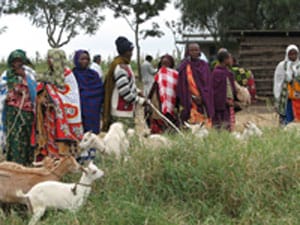 The supply of a she-goat to each family of a sponsored child at the child development center is a new thing not experienced before and not heard of in the whole of Likamba community. There is great excitement and enthusiasm among the people as they now transition to a modern art of cattle rearing, keeping goats in house.
The supply of a she-goat to each family of a sponsored child at the child development center is a new thing not experienced before and not heard of in the whole of Likamba community. There is great excitement and enthusiasm among the people as they now transition to a modern art of cattle rearing, keeping goats in house.
According to the pastor of the church, “goats are more advantageous than cows. They need and use a smaller space. They eat fewer grasses, and this will contribute to the protection of the environment. The goat is a great blessing to the people of Likamba.”
Much effort had to take place before the goat distribution was completed. It was not easy to get the supply of all 244 goats at once. Compassion had to look for the goats from different sources, bringing each lot to the families as they were available. Gathering the goats took about three months to complete.
Before the families were given the goats, the whole community was given three days training on how to take care of them, and each family was given the responsibility of making a special shade for the goats.
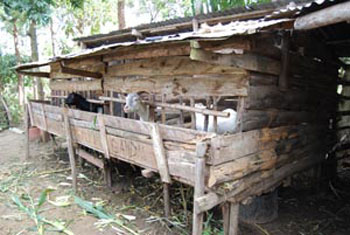
The people of Likamba also formed cooperative groups, and each family is contributing money every month to their common fund. The objectives of the cooperative are to:
- Improve the welfare of the group members and their families.
- Enhance cooperation among the herders and peasants.
- Protect and improve the health of their children.
- Have more power over the products of their labor (i.e., to have more when they sell milk and other products).
All these having been done, the families were ready to receive the goats. On the day of the visit, about 40 parents gathered at the church compound, waiting anxiously to receive the goats.
The pastor of the church welcomed the parents of the sponsored children and guardians to receive their goats. He read the following passage from the word of God,
“You will have plenty of goats’ milk to feed you and your family and to nourish your servant girls.” — Proverbs 27:27 (NIV)
The pastor also said, “The child is building. There will be building through the children. I am praying that Likamba will change.”
Now that all the Compassion families in Likamba have been supplied with a goat, there is great joy and optimism in the community.
I visited several families and took some time to talk with parents about how they have received the support.
Asnath is the mother of sponsored child, Amani. The family has two sponsored children, so they received two goats. I asked Asnath how she feels about the goat support to her family:
“The goat will do a great deal to support family income. With the goat we will be able to get milk. We will use the milk to increase the health of the children in general and sell the milk and use the proceeds to educate our children. Not only milk but we will also get manure, which we will use in our farms and thus increase the farm income for the products we will be growing.”
I asked her how she felt when she heard she was receiving the goat.
“I was very happy to learn that I will receive a goat. I was ready to build. I was ready to build a shade, and I used all the resources I had to accomplish the task. I bought three roofing sheets and two kilograms of nails. I had several pieces of wood, and this helped me finish the shade on time to receive the goat when they arrive. My husband is very happy also about this project ,and he has helped me in building the shade.”
Rose is the grandmother of Amani, and she is taking care of another child of the family, who is a twin sister to Amani and also a sponsored child, Neema.
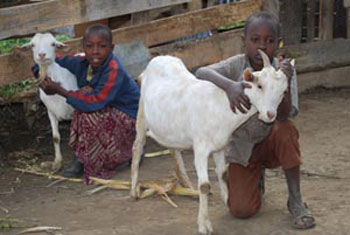
She was asked what her reaction was after learning of the goat support and how she sees the help improving her family’s economic status: “Thank you very much,” she said. “We appreciate it. I will get milk, and when they reproduce I will sell the goats and take better care of my grandson.”
One woman from a nearby village gave a testimony of how blessed the people of Likamba will be after receiving the goats. She told of what happened to her when she received a dairy goat from another organization that was helping poor families in her village.
“I received a loaned dairy goat from a project that was helping people fight poverty. The only condition was for that the loaned beneficiary pay back three goats as they reproduce. In the course of the years I was able to pay back three goats and sold several others. I used the money to buy cows and also buy land. I was able to support my children to go to school.”
But she said the advantage the people of Likamba is that they have not been loaned goats, and they don’t have to pay back.
The celebration and fanfare about the goats came to its climax on August 3, when all the children in the center had received all 244 goats. This was a great day.
People from all corners of the valley and plains of surrounding villages came. Children were dressed in special clothes they were given from the project center. A children’s choir graced the occasion with beautiful Christian songs.
Parents were so excited, and to show their acknowledgment for the goats, they had prepared gifts for the pastor of the church and his wife and the Compassion partnership facilitator and her husband.
The parents appreciated the effort they had put into making this project a reality. Maasai are generous people, and to give like this showed that they had accepted the message of the church.
After the church service, food and drinks were served to the invited guests and the community gathering. The entire time a group of Maasai women was dancing and singing on the church grounds, sending messages across the valleys and hills to celebrate the good news. A new era had dawned in Likamba. It was a special day, praying for the goats and dedicating them for the glory of God, for them to multiply and reach many families in the Maasai plain.
The government committed to support the children’s families and provide them with advice on how to take good care of the goats. The director of Compassion Tanzania, Dr. Emmanuel D. Mbennah, reminded the parents to acknowledge God, who used the sponsor to give them this unique gift.
For their part, the families appreciated the blessing and have promised to pass it on to another village that is running a Compassion ministry. They have decided that each family that got a goat will give out a goat when they multiply to another community. In this way they will support many other families, helping many people in the long run.
People are optimistic that after several years the goats will spread all over the entire area of the Maasai plain and that life will never be the same.


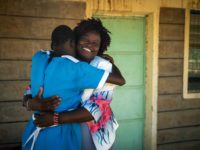
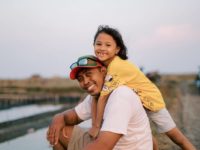
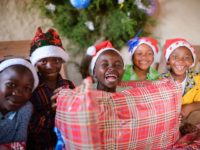


16 Comments |Add a comment
I am always humbled to recall the very beginnings of this project thought, Availing myself ever for being a channel of God’s blessing to others as then SDM would have it…. Bridge! being a Bridge….
Each time I call the project staff, I ask how far the ‘passing’ on of the goat breeds is stretching! its amazing.
I am now in Nairobi pursuing educational dreams
I am always humbled to recall the very beginnings of this project thought, Availing myself ever for being a channel of God’s blessing to others as then SDM would have it…. Bridge! being a Bridge….
now in Nairobi pursuing studies.
I’m so excited to read this story – I found it searching for the name of the village as we have just tonight sponsored an older girl at this project, our second ‘sponsored daughter’ as we call our sponsored children. I wonder whether her family was previously a beneficiary of the goat gift?! Praise God for how he moves in such practical ways to show his love.
This is a heartwarming story. I raise dairy goats and my sponsored child in Haiti has purchased goats with the gifts I send her and her family. I love to hear of this kind of assistance – the kind that raises people up rather than keeping them down. Keep up the good work, Compassion.
This is the kind of story I love to hear. Over the years I have heard many stories like this where a whole community is helped toward becoming self sufficient. I remember on where they helped the village to become pig farmers and they were self sufficient within a year! This is one of the reasons I love Compassion so much.
I am so excited to see this article! Congratulate all who gave funds for glory of God and their time too. I participated in writing the proposal…now outside Compassion for studies in New Zealand I still feel blessed as if I got the goat myself!
God bless you all for giving.
Praise God for men and women who are willing to give their lives and resources to furthering the Kingdom of Heaven. Just simply giving money to the Massai wouldn’t have done much for long. Giving them a resource they could relate to and use to make their money themselves, not only gives them in come, it gives them dignity and some self-confidence that through the strength of God they are able to provide for their family. What a blessing! Thank you Compassion for responding to the call and answering the need. God bless you all tremendously.
I loved hearing the details of this story! It is so uplifting to know the (multiplying) difference that can be made through sharing His gifts.
wow what an amazing story! I hope that someday I can do something like this for the community my girls live in!!
This is such an encouraging story of how something so inexpensive to us can make such a huge difference.
Thank you.
Oh!This a must read story that has eventually published to glorify God. I’m so excited to read this story because I was among of the witnesses during goats’ distribution. Really,these goats have played a major role to transform the lives of maasai community socially, economically as well as physically. May God bless you all who are reading this remarkable story!
Isn’t it amazing the impact one simple gesture can make? A goat would seem so trivial to most people…
I am thrilled to see how this fundraising effort impacted the lives of the families in Likamba. It will mean a lot to the customers, Fashion Consultants and the staff at Optionelle to see how their contribution will make a lasting difference to these families.
What an inspiring post. I love the idea of, not only each family in that project getting a goat, but that they would each pass one on to someone in another Compassion project. This could start an on-going blessing throughout Tanzania! I also appreciated knowing all the benefits that the goats provide.
What an amazing story! It reminds me of the fact that every time I sent Birthday or Christmas money to my boy in Haiti, he would buy a goat. When he completed his education, I sponsored his little brother, and his child packet said his responsibilities at home was “caring for the family’s herd of goats!” It doesn’t take much to help a family (or community) in this way, and the gift has a way of multiplying gloriously in God’s way!